Hi guys, I'm somewhat new to lasers, so please forgive my ignorance.
I'm working on a hobby project, and it needs a laser with a very wide + divergent beam. In short, it needs to be a similar beam width / divergence as a regular flashlight (e.g. say 1m wide at 3m distance, or wider?).
The idea is that it will be portable, and work just like an LED flashlight - only it will have the very narrow spectral width of a laser (1-3nm).
I've tried using an red LED flashlight (ultrafire 1505r), but the spectral width is too wide (20-30nm), which doesn't work for what I need it for.
To get that kind of narrow spectral width, it looks like I'd have to use a laser. But it's going to act like a flashlight, so I need a wide beam - not a small dot like I'd get with a typical laser pointer.
I've looked into beam expanders, but they seem to only go up to 10-20x, which is still way too narrow. Also, they seem to mostly keep the beam divergence low (if I've got that right - i.e. the beam although wide, doesn't get much wider with distance).
I've also looked into laser christmas light displays (which I think use diffraction gratings to spread the beam into multiple dots). This isn't ideal, as I really want an even, wide beam, as opposed to many dots. Also, I'm not sure if the diffraction gratings will alter the wavelength too much. If they increase the spectral width, or then that won't work either.
My final thought was to use something like a monochromatic laser projector: i.e., a system the (I guess) uses a mirror to 'draw' the laser beam over an area. Other than commercial RGB laser projectors, I can't find much. Given the thing needs to be portable (eventually), battery powered and not cost the absolute earth, this probably isn't a sensible option either.
Any help or suggestions would be really, really appreciated.
Thanks,
Adam
I'm working on a hobby project, and it needs a laser with a very wide + divergent beam. In short, it needs to be a similar beam width / divergence as a regular flashlight (e.g. say 1m wide at 3m distance, or wider?).
The idea is that it will be portable, and work just like an LED flashlight - only it will have the very narrow spectral width of a laser (1-3nm).
I've tried using an red LED flashlight (ultrafire 1505r), but the spectral width is too wide (20-30nm), which doesn't work for what I need it for.
To get that kind of narrow spectral width, it looks like I'd have to use a laser. But it's going to act like a flashlight, so I need a wide beam - not a small dot like I'd get with a typical laser pointer.
I've looked into beam expanders, but they seem to only go up to 10-20x, which is still way too narrow. Also, they seem to mostly keep the beam divergence low (if I've got that right - i.e. the beam although wide, doesn't get much wider with distance).
I've also looked into laser christmas light displays (which I think use diffraction gratings to spread the beam into multiple dots). This isn't ideal, as I really want an even, wide beam, as opposed to many dots. Also, I'm not sure if the diffraction gratings will alter the wavelength too much. If they increase the spectral width, or then that won't work either.
My final thought was to use something like a monochromatic laser projector: i.e., a system the (I guess) uses a mirror to 'draw' the laser beam over an area. Other than commercial RGB laser projectors, I can't find much. Given the thing needs to be portable (eventually), battery powered and not cost the absolute earth, this probably isn't a sensible option either.
Any help or suggestions would be really, really appreciated.
Thanks,
Adam





